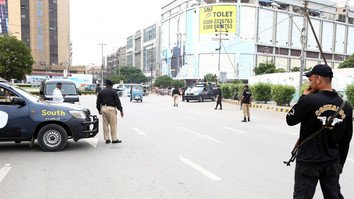PESHAWAR -- The Khyber Pakhtunkhwa (KP) Assembly last month passed a new law aimed at stamping out illegal drugs in the province, especially crystal meth, also known as "ice".
The assembly on August 27 passed the KP Control of Narcotics Substances Bill 2019, which defines narcotic substances, outlines the punishment for trafficking, processing and transporting illegal drugs and establishes special courts.
The bill has been sent to KP Governor Shah Farman, who is expected to sign it into law within 30 days.
"One of the many objectives of the KP Control of Narcotics Substances Bill 2019 was to completely eliminate the existence of ice from society and save the younger generation from the perils of drugs," said KP Information Minister Shaukat Yousafzai.
![A man smokes drugs September 2 near the pillar of a bridge in Peshawar in 2019. [Muhammad Shakil]](/cnmi_pf/images/2019/09/13/19867-drugs2-585_329.jpg)
A man smokes drugs September 2 near the pillar of a bridge in Peshawar in 2019. [Muhammad Shakil]
"We also want to clear each and every corner of the province of ice, therefore severe punishment has been suggested for people involved in its transportation and possession," he said. "After consultations with the relevant authorities, special courts will be established to deal with cases registered under the bill."
"Harsh punishments for those involved in the trafficking, processing, production and transportation of narcotics, especially ice, substantiate the serious intention of government to clear society of these evils," said Farhana Marwat, a narcotics lawyer in Peshawar.
"Severe and capital punishment as mentioned in the bill will... keep them away from any form of drug, its handling and possession," she said.
"The effectiveness of the bill could be further increased if steps were taken to ensure uniformity by introducing the same legislation all over the country without any indiscrimination," she said, adding that "disparity of punishment would undermine the legislation and reduce its effectiveness."
Moreover, officials must ensure that the legislation will not be used by anyone, including the police, to target opponents by implicating them in drug-related cases, said Marwat.
"The chances of achieving the target of a drug-free society can be increased by the strict monitoring of areas from which raw material to manufacture contraband items is being smuggled in the country and arresting smugglers involved in the large scale transportation of narcotics," she said.
Protecting youth
"It is a very simple phenomenon that a youth that is kept away from social evils and is more confident of his or her future prospects will be very difficult to deceive and manipulate," said Farhan Javaid, a lecturer at the Government Degree College Peshawar. "On the contrary, a drug addict faced with a bleak future could easily be handled and recruited by extremists."
"Drug usage affects the innate ability of a person to differentiate right from wrong, and makes him obsessed with committing wrongful acts for his needs," he said.
"The chances of deviant behaviour are increased exponentially in the situation when an individual is ready to do what is difficult to imagine in normal circumstances."
"The narcotics bill is excellent legislation that will certainly be effective in inhibiting addiction among students due to... capital punishment for persons involved in the possession and transportation of ice," he added.
"Identifying the reasons behind the deviation of our young generation towards unwanted activities including extremism and militancy can be helpful to effectively control the occurrence of these events," said Syed Abbas Shah, the general secretary of the Youth Anti-Terrorism Organisation (YATO).
"In some cases it was clear that anti-social elements lured youth by deceit and by offering them temporary financial gains... it is much easier to target and manipulate drug addicts owing to their weaknesses and mental disposition."
Drug trafficking has also been linked to terror financing, he said.
"The punishments mentioned in the narcotics bill, including the death penalty for ice possession, will not only negatively impact its smuggling on a large scale but also compel the younger generation to refrain themselves from drugs," Shah said.

![A drug addict consumes heroin beside a railway track near the Karkhano market in Peshawar 2019. The KP Assembly passed the Control of Narcotics Substance Bill in August 2019. [Muhammad Shakil]](/cnmi_pf/images/2019/09/13/19866-drugs1-585_329.jpg)







Killing people for simple possession is wrong. These people are addicts. They have a disease. The state doesn’t kill people with aids..... addicts need treatment not execution. This is a gross human rights violation and should be stopped!
Reply1 Comment(s)